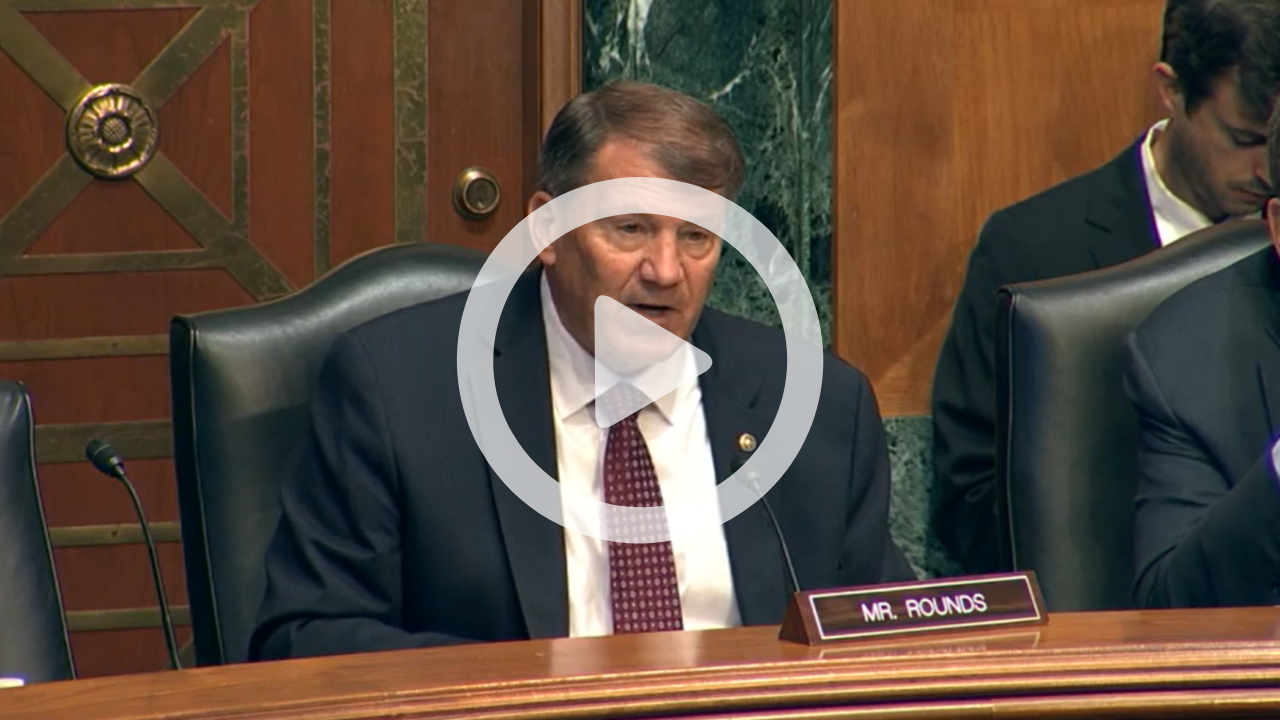Rounds Delivers Opening Remarks at Securities, Insurance and Investments Subcommittee Hearing
Rounds was named chairman of the Subcommittee for the 119th Congress
WASHINGTON – U.S. Senator Mike Rounds (R-S.D.), chairman of the Senate Banking, Housing, and Urban Affairs Committee’s Subcommittee on Securities, Insurance, and Investments, today delivered opening remarks at a hearing titled “Guardrails and Growth: AI’s Role in Capital and Insurance Markets.”
This is the first Subcommittee hearing of the 119th Congress and the first hearing with Rounds serving as chairman. The hearing examined how artificial intelligence (AI) is transforming financial services and Congress’ role in fostering innovation while promoting transparency and accountability. The witnesses included Kevin Kalinich, Intangible Assets Global Leader at Aon; Tal Cohen, President of NASDAQ; and Dr. David Cox, Vice President for AI Models at IBM Research.
“We need regulatory frameworks that both support innovation and protect consumers,” said Rounds. “As AI continues to evolve, regulators also have an opportunity to modernize their own operations. AI can help agencies conduct smarter supervision, reduce unnecessary burdens on smaller institutions, and focus resources where they’re most needed. There’s a real opportunity for public-private collaboration in this space, and I hope today’s hearing helps us think more clearly about how to make that happen.”
Read Rounds’ full remarks as prepared for delivery below. Watch a clip of Rounds’ opening statement HERE.
+++
Good morning. I’d like to call this hearing of the Securities, Insurance, and Investment Subcommittee to order.
I want to begin by thanking Ranking Member Warner for his partnership not only in this subcommittee but on countless other initiatives. He is an incredible leader on AI policy issues and of course in the intelligence space.
Next, I want to thank the members of our bipartisan witness panel for joining us today—Mr. Kalinich, Mr. Cohen and Dr. Cox.
We appreciate the expertise you bring to this important discussion on the growing role of artificial intelligence in capital and insurance markets.
The title of today’s hearing: “Guardrails and Growth,” captures what we’re here to do: examine how AI is transforming financial services and explore how Congress can foster innovation while promoting transparency, accountability, and smart oversight.
AI is here, it’s not going away, and it has already made a significant impact across the financial system.
In capital markets, firms are using AI to analyze massive volumes of data in real time, from trading patterns to financial disclosures, to guide investment decisions, execute trades more efficiently, and reduce costs.
Asset managers are using AI to identify emerging risks and opportunities that traditional tools might miss, while exchanges are integrating AI into market surveillance systems to detect manipulation and protect market integrity.
In insurance, AI is reshaping how companies assess risk and deliver coverage, particularly when it comes to underwriting businesses. Insurers are using machine learning to analyze structured data such as claims histories, industry benchmarks and even real-time operational data to better understand a company’s risk profile.
These tools are helping insurers price policies more accurately, speed up underwriting decisions and expand coverage to companies that previously may have been too complex or too risky to evaluate.
That said, underwriting policies for businesses using AI is exceptionally difficult because the insurance market’s understanding of generative and other forms of AI is still in its infancy. More work needs to be done here to provide clarity, whether by Congressional action or through the work of standard setting bodies like National Institute of Standards and Technology or NIST.
Fraud prevention is another area where AI is already delivering tangible results. According to the Card Policy Council, one major credit card network’s AI-driven security enhancements have boosted their fraud detection rates by up to 300% and prevented over $50 billion in fraud in just the past three years. Another has blocked over $40 billion in attempted fraudulent transactions.
McKinsey has reported that AI systems can reduce fraud detection costs by 30% while improving true-positive detection rates and reducing false alerts.
This is exactly the kind of progress we should be encouraging.
That’s why, today, I’m reintroducing the Unleashing AI Innovation in Financial Services Act, with Senators Heinrich, Kim and Tillis and House Financial Services Chairman French Hill.
This bipartisan bill would create a venue for financial institutions and regulators to work together to test AI projects for deployment. By creating a safe space for experimentation, we can help firms innovate and regulators learn, without applying outdated rules that don’t fit today’s technology.
We’ve also seen how the wrong approach can create serious problems.
Last Congress, former SEC Chair Gary Gensler proposed the Predictive Data Analytics Rule which, I believe, would have imposed sweeping, unclear restrictions on financial firms developing or deploying AI, without a workable framework.
That rule would have slowed innovation, raised compliance costs, and locked out smaller players.
That’s why Ranking Member Warner and I led the opposition to stop that proposal.
We need regulatory frameworks that both support innovation and protect consumers.
As AI continues to evolve, regulators also have an opportunity to modernize their own operations.
AI can help agencies conduct smarter supervision, reduce unnecessary burdens on smaller institutions and focus resources where they’re most needed.
There’s a real opportunity for public-private collaboration in this space, and I hope today’s hearing helps us think more clearly about how to make that happen.
I want to again thank our witnesses for being here today.
You are experts in your fields and your insights are critical as we consider next steps in policy and legislation.
With that, I’ll turn it over to Ranking Member Warner for his opening remarks.
###
